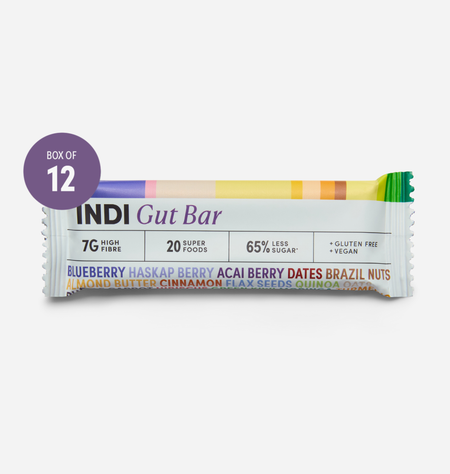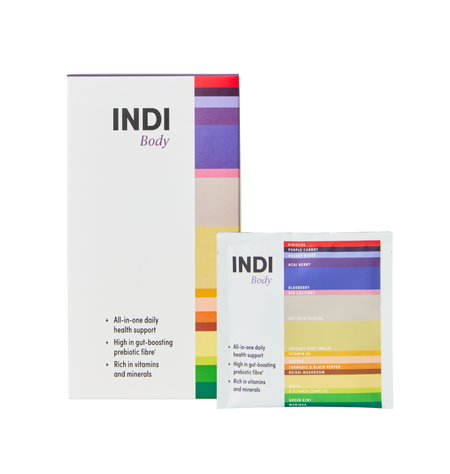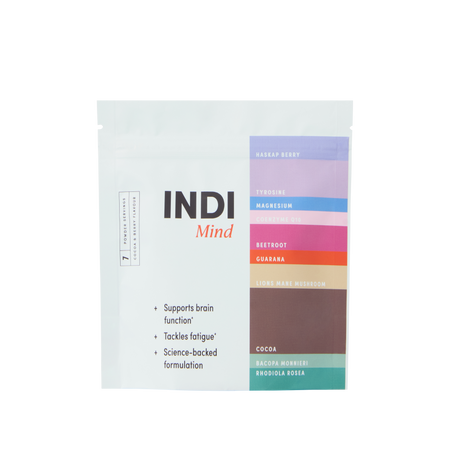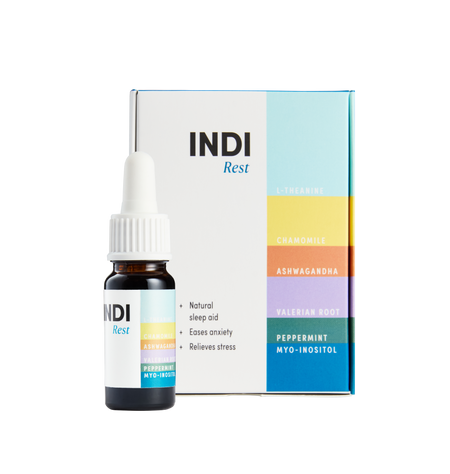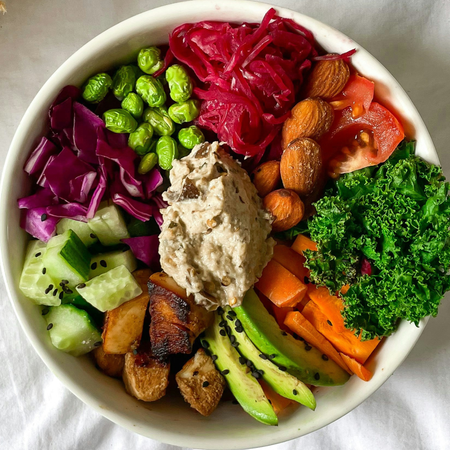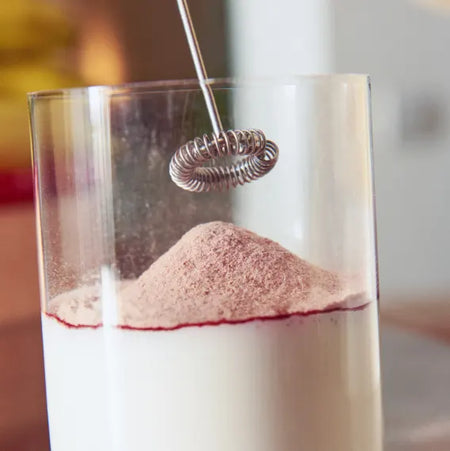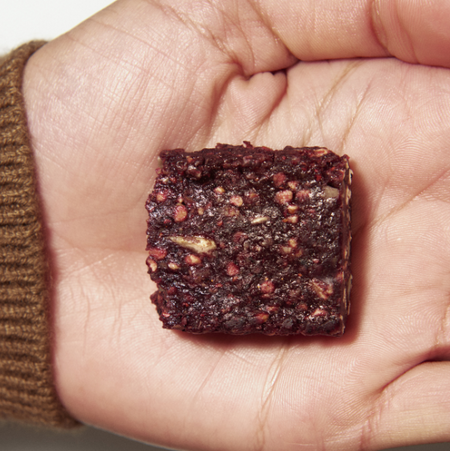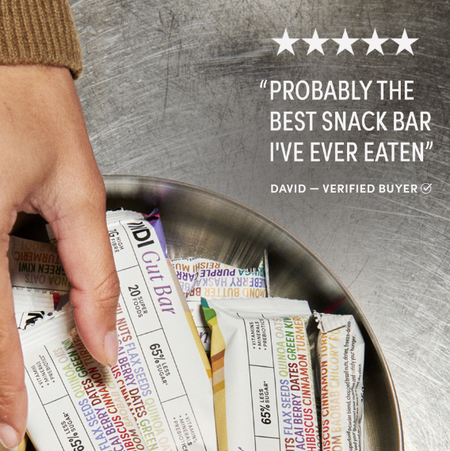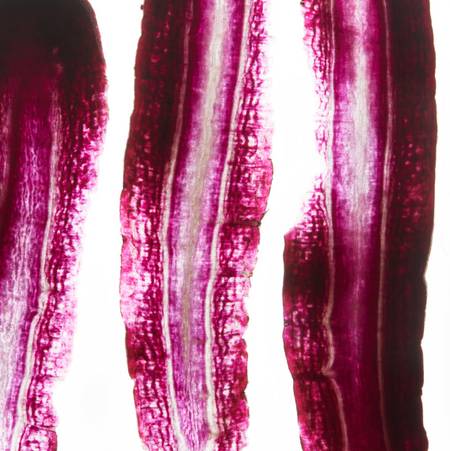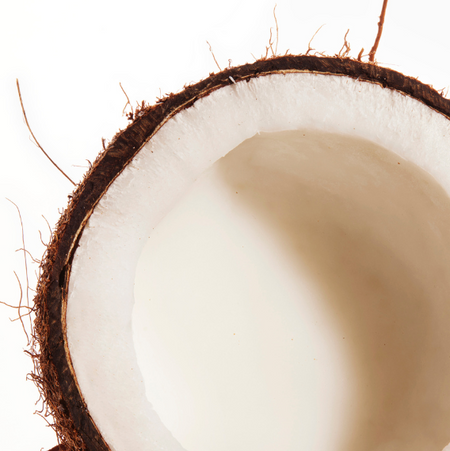Why do we need fibre?
Let’s be honest, fibre hasn’t always had the best PR. But it should, and here’s why:
- 96% of the UK population is deficient in fibre. In fact, the vast majority of us don’t even come close to the recommended daily intake of 30g per day.
- By increasing your daily fibre intake by just 8g, you could lower your risk of dying from any chronic disease by up to 27%.
So, by addressing this single deficiency, we could drastically improve the health of our nation. Now that’s food for thought.
SO, WHAT IS FIBRE?
Fibre is the name given to complex carbohydrates that are found in all plant-based foods. Essentially, fibre gives plants their structure allowing them to form all the beautiful shapes we see in nature.
WHAT DOES FIBRE DO FOR HUMANS?
Humans can’t digest fibre like they can other carbohydrates. Instead, fibre passes through our stomach and our small intestine unchanged, helping the digestive process on its way by stimulating the wave-like movement of our gut muscles to push food along. Once it enters the large intestine, fibre is broken down by the millions of tiny microbes in our gut, also known as the gut microbiome. They busily ferment the fibres to feed themselves and create very helpful chemicals called postbiotics as a by-product of the fermentation process.
WHAT HAPPENS WHEN WE DON’T EAT ENOUGH FIBRE?
A lack of fibre has many negative effects on our health. Unsurprisingly, the digestive process will slow down which can lead to constipation, indigestion and bloating as common short-term symptoms. In the long-term, fibre deficiency can result in ulcers, inflammatory bowel diseases and even colon cancer, as well as making us feel sluggish and unwell.
WILL FIBRE MAKE ME LESS HUNGRY?
Absolutely, studies have shown that increasing fibre intake is associated with increased satiety and feelings of fullness. Fibre-rich foods slow down the speed at which we absorb sugars and fats from our foods, giving our bodies time to process and clear these foods from our bloodstream. It also means we are less likely to eat more food than we need, as we will feel fuller for longer.
WHICH FOODS ARE HIGHEST IN FIBRE?
Fruits, vegetables, pulses, nuts, seeds and whole grains.
HERE’S A FEW TIPS TO EASILY (AND DELICIOUSLY!) GET MORE FIBRE AND PLANTS IN YOUR DIET:
- Add Indi Body to your routine, which contains 5g of fibre per serving.
-
Add mixed seeds to smoothies, porridge, soups, yoghurt and salads. This not only increases fibre and protein but also enhances plant variety—key for feeding a diverse gut microbiome.
- Snack smart. Keep a stash of mixed nuts and seeds paired with fresh fruit like an apple, pear, or berries. This combo gives you fibre, healthy fats, protein and a natural source of sweetness.
-
Include legumes daily. Add lentils, chickpeas, black beans, or kidney beans to salads, stews, soups, wraps, or even pasta sauces. Canned/jarred versions are quick and easy.
-
Swap refined carbs for whole grains. Choose wholemeal bread, brown rice, wholegrain pasta, oats, or quinoa over their white/refined counterparts to naturally increase fibre throughout the day.
-
Make colourful tray bakes. Chop a mix of vegetables (e.g. peppers, courgettes, onions, carrots, cauliflower) and roast with olive oil, herbs, salt and pepper.
- Bulk up sauces and soups with any leftover vegetables you have in the fridge to pasta sauces, soups, or curries. They blend in easily while boosting fibre and nutrients.
- Try a ‘plant points’ challenge. Aim for 30 different plant foods each week—this includes fruits, vegetables, nuts, seeds, whole grains, beans, lentils, herbs, and spices. The variety feeds different beneficial gut bacteria.
- Use veggie-based dips and spreads. Swap mayo or butter for hummus or guacamole on sandwiches or toast—great ways to sneak in legumes and fibre. Hummus can also be made with any bean!
- Start your day with fibre. Have porridge/yoghurt topped with fruit, seeds, and nut butter; or try wholegrain toast with avocado and a sprinkle of sesame or hemp seeds.
- Batch-cook fibre-rich meals. Make large portions of chilli, lentil soup, or bean stew that you can freeze and reheat—ideal for busy days and helps you stay consistent.
GO LOW AND SLOW
Just remember: when adding more fibre to your diet, go low and slow. Your gut bugs need time to adjust—it’s like throwing them a big party, and at first, they might get a little overexcited and produce extra gas. But they will adjust over time.
Body
£55.00
Daily Gut Support
Our delicious berry flavour whole food and fibre-rich plant powder bolsters your daily diet to improve gut health, digestion, energy, mood and more. Loved by nutritionists, it's an everyday essential that virtually anyone will benefit from.
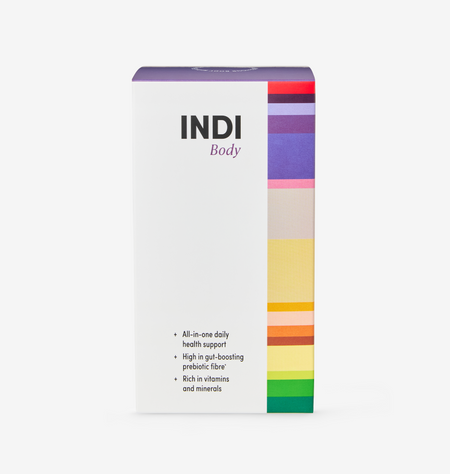
Gut Bars
from £20.00
A delicious, chewy, nutty, daily hit of gut-boosting greatness. 12x 35g per box.
